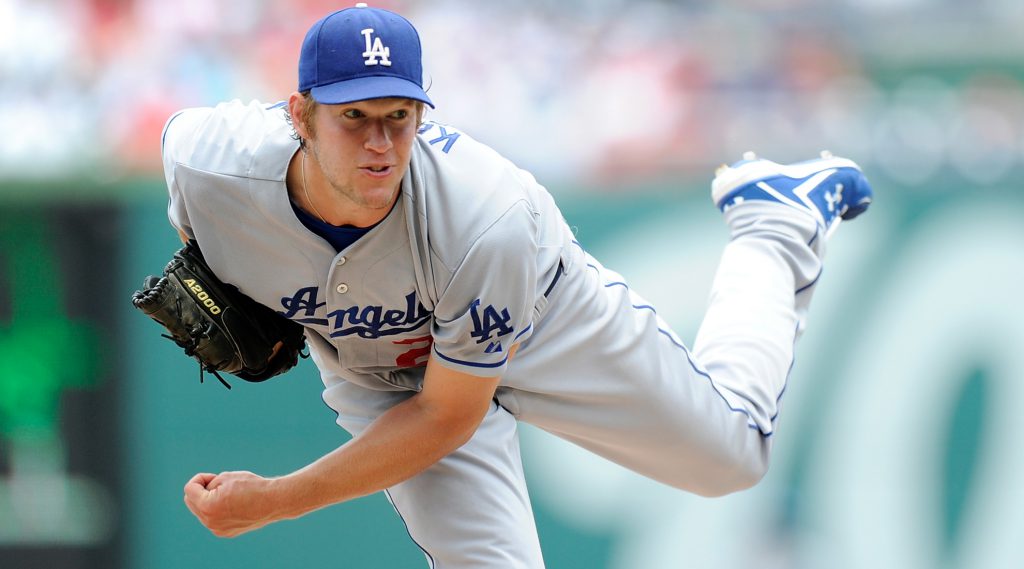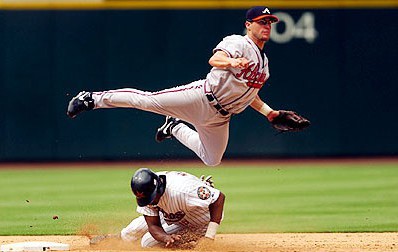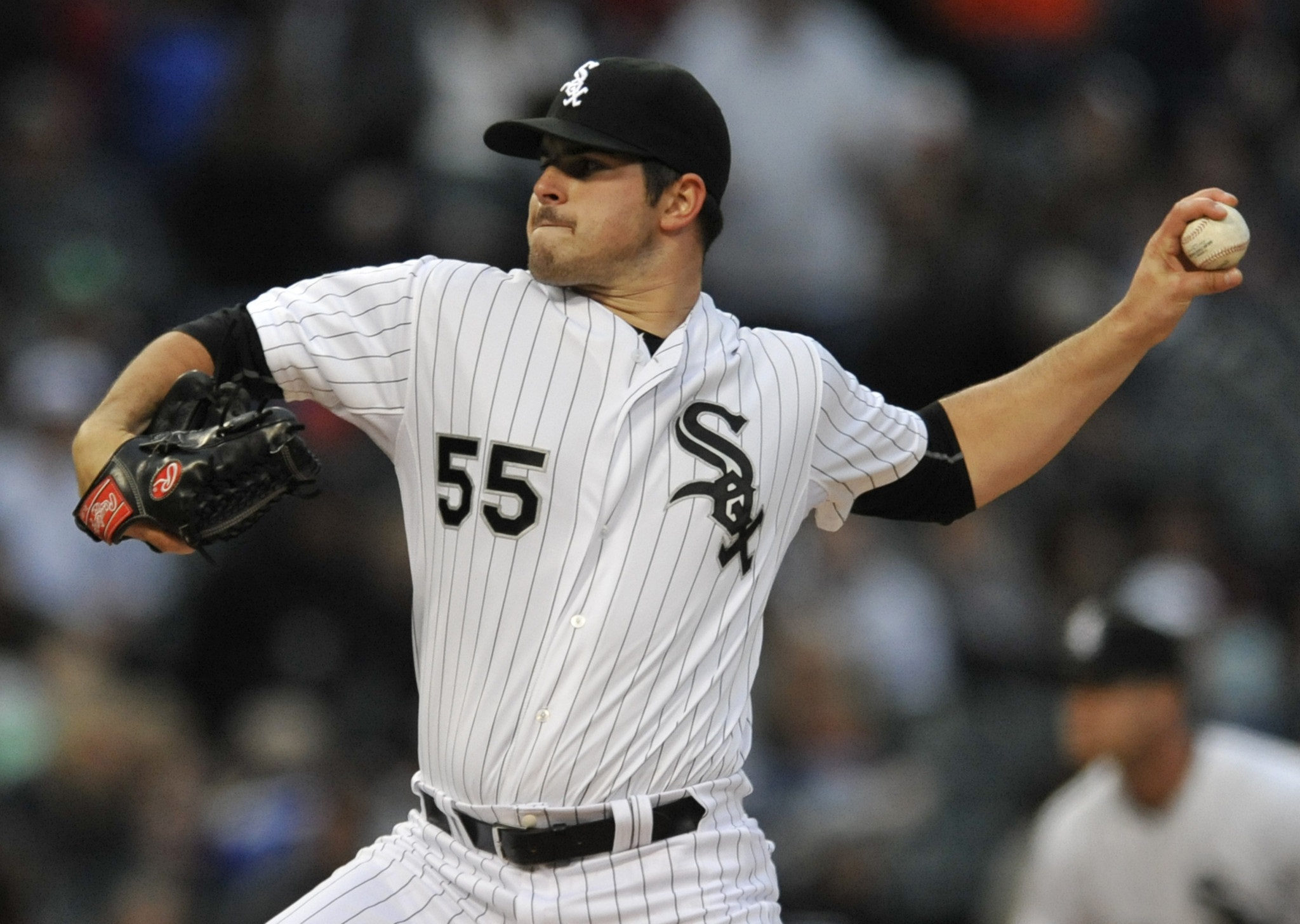In MLB DFS, FanDuel awards 12 points to pitchers who win their games. DraftKings awards four points for wins. After the jump, I’ll tell you more obvious facts!
This is the 66th installment of The Labyrinthian, a series dedicated to exploring random fields of knowledge in order to give you unordinary theoretical, philosophical, strategic, and/or often rambling guidance on daily fantasy sports. Consult the introductory piece to the series for further explanation.
What Is a Win Worth on FanDuel?
I’ve written multiple times about FanDuel pitchers who win. Ultimately, the number of innings pitched per start is important: The longer a pitcher tends to last in his outings, the greater his odds are of winning any given game he starts.
Of course, the Vegas moneylines are also predictive. The greater the odds are that a pitcher’s team will win a contest, the greater the odds that he will be the pitcher credited with the win.
But what does all of this mean in terms of fantasy production? We assume that A) the higher the moneyline is, the better odds a pitcher has to win, and that B) the likelier a pitcher is to win, the greater his value is on FanDuel in relation to DraftKings. But is that true?
If we use our free Trends tool to look at the Plus/Minus values that accompany moneylines, will we find that wins (as predicted by Vegas) are actually worth more on FanDuel than DraftKings?
And, if wins (and/or high moneylines) actually do mean more on FanDuel, is that added value enough to compensate for the high FanDuel ownership that we often see with pitchers who win?
These are just some of the questions that I have. I don’t have all the answers, but I do have some of them.
The Research
To find the value of wins on FanDuel and DraftKings, I used the Trends tool to look at all moneylines from -101 to -300. I evaluated them in 10-point ranges (-101 to -110, -111 to -120, etc.), recorded their Plus/Minus values, Consistency ratings, average expected points, and so on, and then did some calculations to discover correlation coefficients, R-squared values, and some other numbers that will bore you.
I found it exhilarating.
Plus/Minus, Consistency, and other premium exclusive metrics are accessible via our free Ratings tool.
Here are some general observations I made of the data set as of this morning (July 1, 2016):
-101 to -110 Moneyline
For FanDuel and DraftKings, this moneyline range was slightly negative (-0.23 Plus/Minus on FanDuel, -0.06 on DraftKings). This suggests that perhaps the platforms are marginally overvaluing these favorites. It’s as if the platforms are saying, “They’re favorites, let’s raise the price a little bit,” instead of saying, “They’re barely favorites, let’s be sure not to be too aggressive with their pricing.”
Not all favorites are created equal . . . as evidenced by the fact that this moneyline range is the only one to have a negative Plus/Minus on both sites. All other moneyline ranges yield positive Plus/Minus values.
So perhaps we can forgive the platforms for pricing the ‘-101 to -110 guys’ aggressively. In general, favored pitchers deserve to be priced up. In fact, for the pitchers with moneylines above -110, the platforms tend not to be aggressive enough with their salaries.
All of this points to two main facts:
No. 1: If you are rostering a pitcher who is only slightly favored, you are probably overpaying.
No. 2: If you aren’t rostering a pitcher with at least a -111 moneyline, you are probably choosing the wrong pitcher.
Average Expected Points
As seen in our Plus/Minus metric, expected points is strongly correlated with salary: The higher the salary is, the more points we’d expect from a pitcher.
On both FanDuel and DraftKings, the correlation between moneyline and salary/average expected points was incredibly strong. On FanDuel, the R-squared value was an unreal 0.99. On DraftKings, it was a slightly more real 0.93.
Think about this: On both sites, more than 90 percent of the variance that we see in expected points for pitchers can be explained by moneyline. I suspect that, with Vegas being what it is, moneyline encapsulates more than just odds to win — at least for the purposes of DFS. Moneyline likely correlates to a starting pitcher’s ability to get outs via strikeouts, to pitch late into games, to avoid giving up runs, etc. In short, moneyline probably contains within it everything that we as DFS players care about when looking at pitchers.
If you want to know why a guy has experienced a Salary Change — why his salary is what it is — look at the moneyline. In terms of DFS expectations, moneyline is basically everything, especially on FanDuel.
Plus/Minus Percentage: What It Is
Here’s something to keep in mind: A +1.00 on FanDuel isn’t necessarily — and in fact probably is not — comparable to a +1.00 on DraftKings. In general, what matters is not how many points above or below expectation a pitcher is. What matters is the percentage by which he exceeds or falls short of expectation.
For instance, a pitcher with a moneyline between -121 and -130 has a +0.75 Plus/Minus on FanDuel and a +0.72 on DraftKings. Pretty similar, right? Not at all.
On FanDuel, this pitcher is expected to score 29.1 points, and so he overperforms his expectation by 2.58 percent. On DraftKings, this pitcher is expected to score 15.02 points — almost half of his FanDuel total — and so his +0.72 Plus/Minus represents a 4.79 percent overperformance.
So Plus/Minus matters, but in this exercise the metric itself must be placed within a larger context that allows an apples-to-apples comparison between FanDuel and DraftKings.
Hence, the Plus/Minus Percentage: Plus/Minus divided by expected points.
Plus/Minus Percentage: What It Shows
Here’s why I’m bringing up Plus/Minus Percentage: It points to a big difference between FanDuel and DraftKings.
On FanDuel, moneyline correlates fairly well with the production that we see via Plus/Minus Percentage, with a 0.74 R-squared value. In general, as the moneyline increases, the Plus/Minus Percentage on FanDuel steadily increases. On DraftKings, though, there’s much more variance, as the 0.59 R-squared value indicates. Although moneyline explains the majority of the variance we see in pitcher production at DraftKings, its impact at FanDuel is much more substantial.
Why? Because of the 12-point bonus winning pitchers get at FanDuel. (That’s why we’re doing this exercise in the first place.)
So it’s as we expected. Moneyline matters more on FanDuel than on DraftKings . . . but there’s a wrinkle.
It doesn’t just matter more. It matters a lot more.
Consistency on FanDuel
In cash games especially, Consistency is everything. Consistency is basically the historical odds that a pitcher within a given set of circumstances will reach his salary-based expectations. And Consistency for pitchers on FanDuel basically comes down to moneyline. At least that’s what the the 0.91 R-squared value suggests.
That one number actually might be the key to profitability in MLB DFS (at least on FanDuel). Of all the factors that impact a pitcher’s ability to reach expectations, in the end, over 90 percent of it comes down to moneyline. If a pitcher has a moneyline between -101 and -110, he historically reaches expectations 50.1 percent of the time. If his moneyline is between -291 and -300, he tends to hit his mark 81.8 percent of the time. And in between, from -111 to -290, Consistency steadily climbs.
Again, all of this comes down to the 12-point bonus that winning pitchers receive. How important is getting a pitcher win on FanDuel? Incredibly important. The win (and/or the moneyline) on FanDuel is basically what turns pitcher performance from a coin-flip proposition into a predictable phenomenon.
Consistency on DraftKings
So moneyline doesn’t mean anything for DraftKings, right? That’s kind of the attitude that people have. On FanDuel, you want wins. On DraftKings, you prioritize strikeouts, which have nothing to do with the moneyline. Ergo, the moneyline has no impact on whether a pitcher reaches his salary-based expectations on DraftKings. At least that’s the narrative employed by a lot of DFS players.
But that narrative is false. The moneyline matters on DraftKings — not as much as on FanDuel, but it still matters, given the 0.62 R-squared value. Moneyline and Consistency are still correlated. Moneyline explains the majority of what we see out of Consistency on DraftKings. Most people would not expect that to be the case, which means that moneyline is probably undervalued by DFS players in DraftKings tournaments, which means . . . #OwnershipArbitrage
Moneyline isn’t the be-all end-all on DraftKings, but when DFS players evaluate pitchers it probably is the metric that they most undervalue on the platform.
Moneyline is important — and not just on FanDuel.
Do We Need a Conclusion?
We’ve always assumed that moneyline is important on FanDuel for pitchers. Now we know exactly how important it is. And we also know that it’s deceptively important on DraftKings as well.
If you want to give yourself a real chance of rostering pitchers who meet expectations at least 60 percent of the time over the long term, on both platforms you’ll explicitly target pitchers with moneylines no worse than -191 to -200. Almost uniformly, pitchers in and above that tier have Consistency ratings of at least 60 percent.
As a cohort, pitchers with moneylines between -191 and -300 on FanDuel have Consistency ratings of 68.89 percent.
On DraftKings? 69.48 percent. Yes — the Consistency rating is actually higher on DraftKings.
As I said earlier: Moneyline is important — and not just on FanDuel.
Regardless of platform, it’s almost the only metric that matters for pitchers.
———
The Labyrinthian: 2016, 66
Previous installments of The Labyrinthian can be accessed via my author page. If you have suggestions on material I should know about or even write about in a future Labyrinthian, please contact me via email, [email protected], or Twitter @MattFtheOracle.





